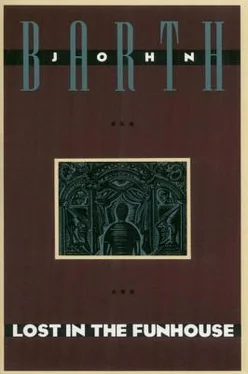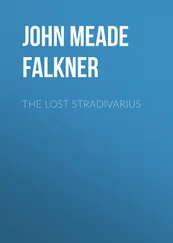5) The triply schizoid monologue entitled “Title” addresses itself simultaneously to three matters: the “Author’s” difficulties with his companion, his analogous difficulties with the story he’s in process of composing, and the not dissimilar straits in which, I think mistakenly, he imagines his culture and its literature to be. In the stereophonic performance version of the story, the two “sides” debate — in identical authorial voice, as it is after all a monologue interieur —across the twin channels of stereo tape, while the live author, like Mr. Interlocutor between Tambo and Bones in the old showboat-shows, supplies such self-interrupting and self-censoring passages as “Title” and “fill in the blank”—relinquishing his role to the auditor at the.
6) The six glossolalists of “Glossolalia” are, in order, Cassandra, Philomela, the fellow mentioned by Paul in the fourteenth verse of his first epistle to the Corinthians, the Queen of Sheba’s talking bird, an unidentified psalmist employing what happens to be the tongue of a historical glossolalist (Mme Alice LeBaron, who acquired some fame in 1879 from her exolalic inspirations in the “Martian” language), and the author. Among their common attributes are 1) that their audiences don’t understand what they’re talking about, and 2) that their several speeches are metrically identical, each corresponding to what in fact may be the only verbal sound-pattern identifiable by anyone who attended American public schools prior to the decision of the U. S. Supreme Court in the case of Murray v. Baltimore School Board in 1963. The insufferability of the fiction, once this correspondence is recognized, makes its double point: that language may be a compound code, and that the discovery of an enormous complexity beneath a simple surface may well be more dismaying than delightful. E.g.: the maze of termite-tunnels in your joist, the intricate cancer in her perfect breast, the psychopathology of everyday life, the Auschwitz in an anthill casually DDT’d by a child, the rage of atoms in a drop of ink — in short, anything examined curiously enough.
7) The deuteragonist of “Life-Story,” antecedent of the second-person pronoun, is you.
John Barth was born on May 27, 1930, in Cambridge, Maryland. As a student at Johns Hopkins University he was fascinated by Oriental tale-cycles and medieval collections, a body of literature that would later influence his own writing. He received his B.A. from Johns Hopkins in 1951 and his M.A. in 1952. He has held professorships at Pennsylvania State University, the State University of New York at Buffalo, and Boston University. He presently teaches in the English and Creative Writing programs at Johns Hopkins.
Barth’s first novel, The Floating Opera (1956), was nominated for the National Book Award. The End of the Road (1958) was also critically praised. In 1960, The Sot-Weed Factor —a comic historical novel — established Barth’s reputatation. Giles Goat-Boy (1966) was a huge critical and commercial success, after which he revised and republished his first three novels. Lost in the Funhouse , a book of interconnected stories, earned him a second nomination for the National Book Award. His other works are Chimera (1972), a collection of three novellas which won the National Book Award; Letters (1979), an epistolary novel; Sabbatical: A Romance (1982); and The Friday Book (1984), a collection of essays. His latest work is The Tidewater Tales (1987).












